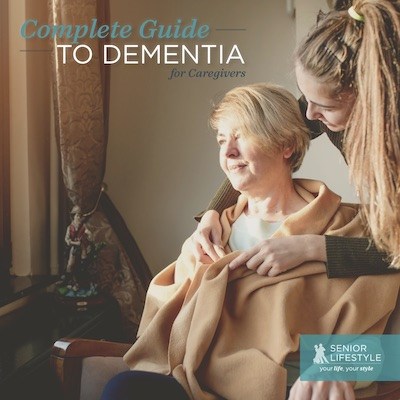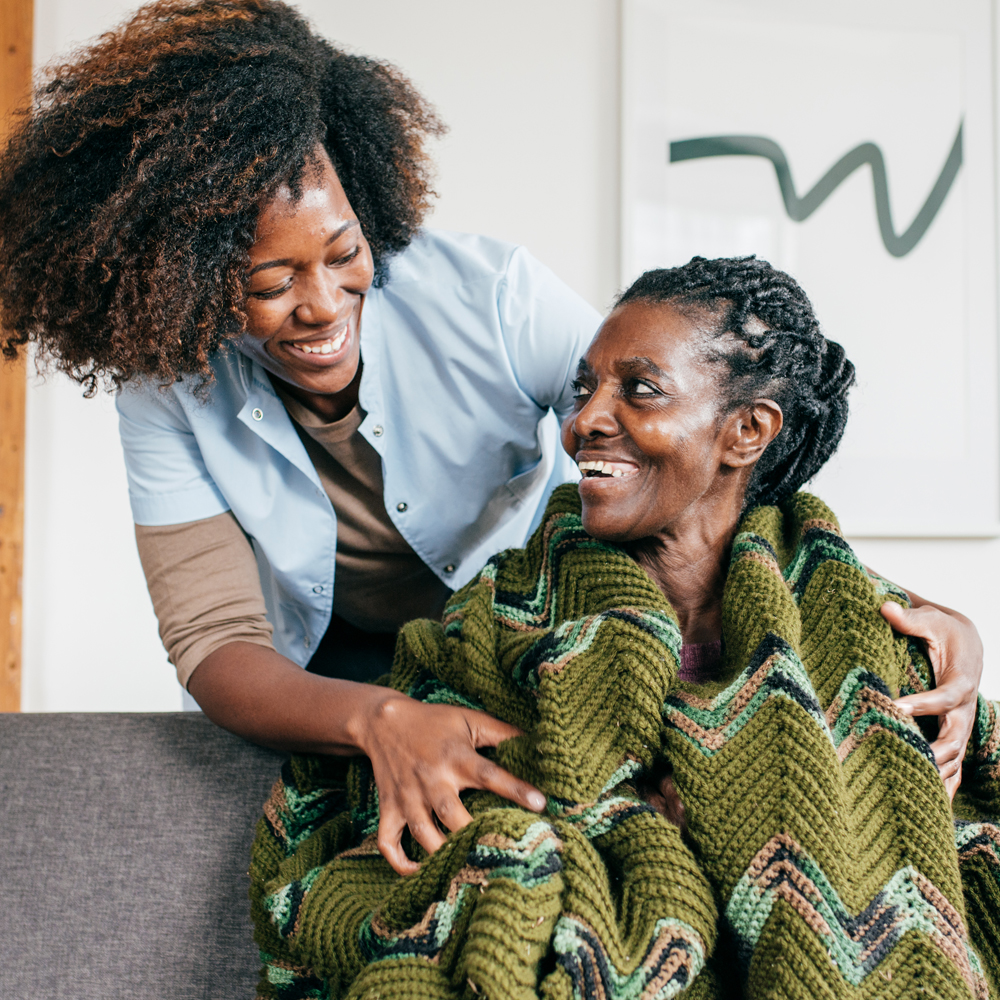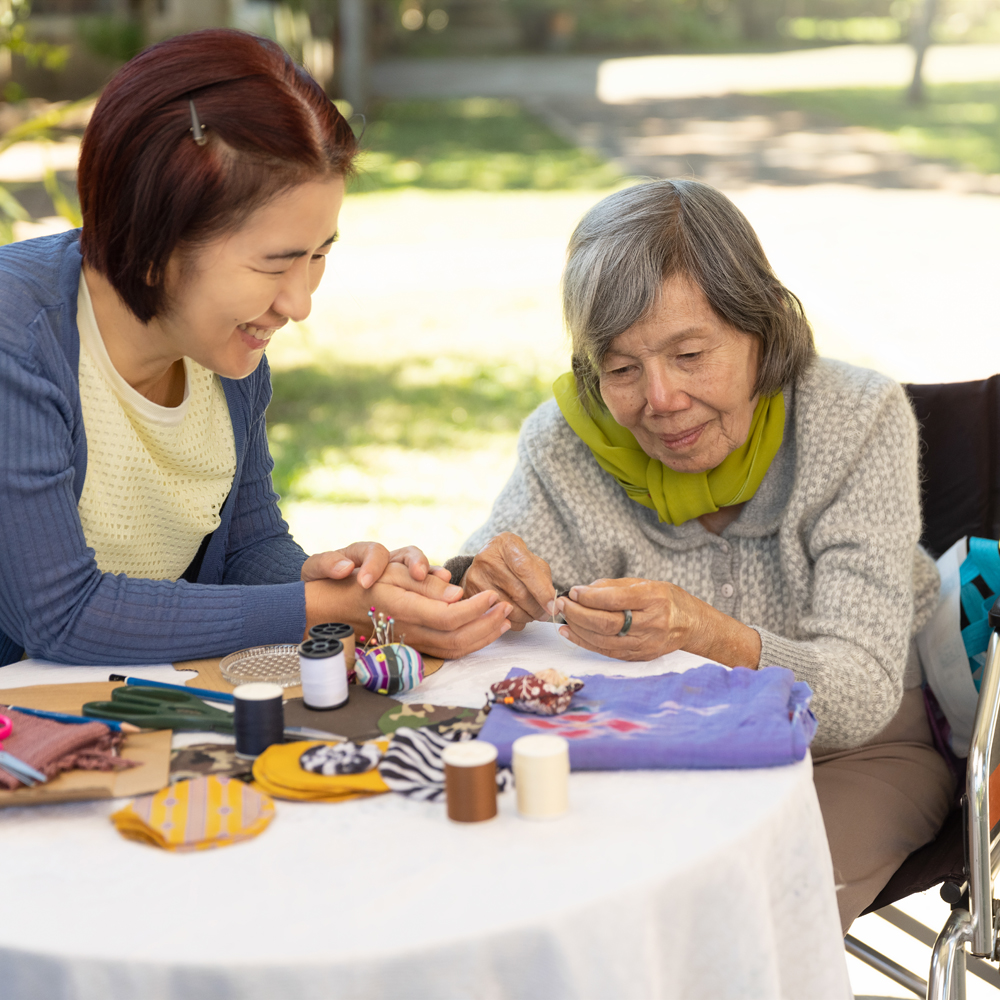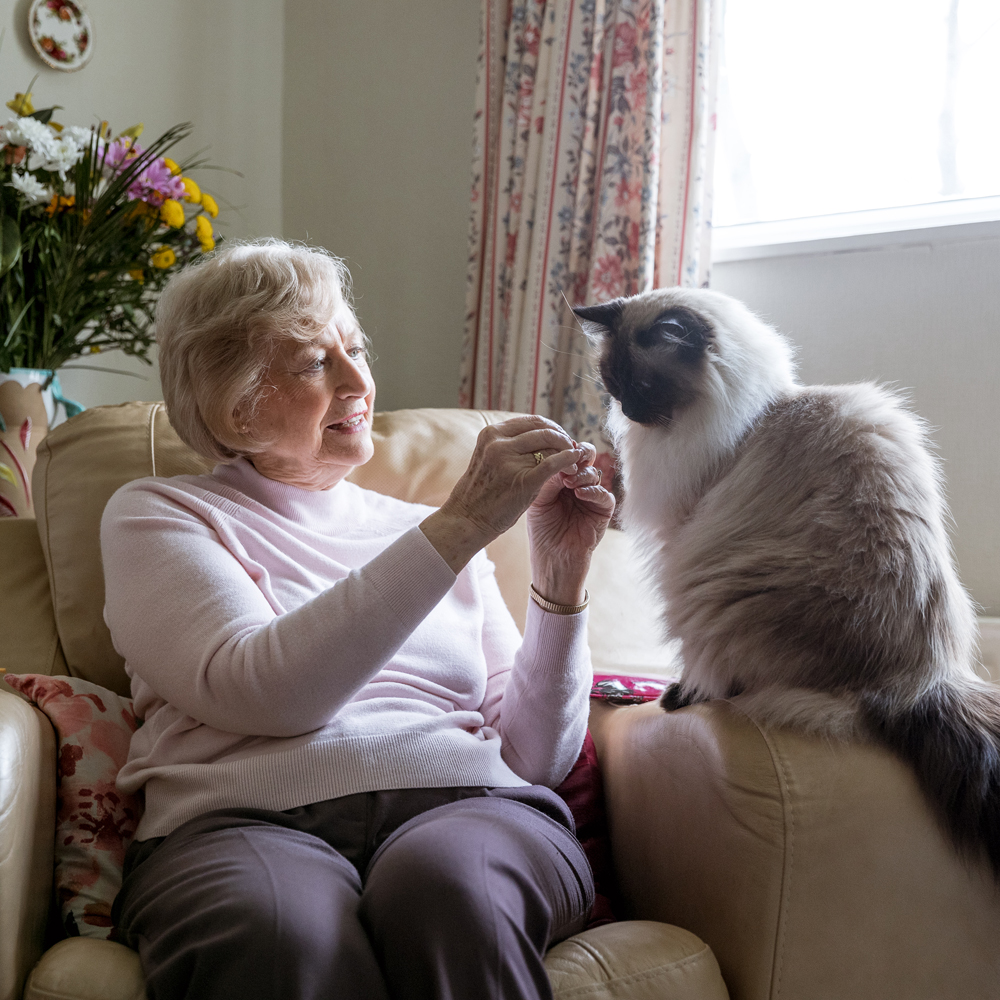Memory Care at Senior Lifestyle
When memories fade, it’s the moments that matter—and our Memory Care program exists to create moments that are altogether authentic and enjoyable.
Residents are cared for in mind, body and soul through a coordinated, comprehensive approach to wellness. This philosophy ensures that the daily rhythm of life is filled with joy and serenity.
Senior Lifestyle communities focus on making each day more vibrant for residents, no matter their current abilities and cognition. Our Memory Care communities are designed with comfort in mind, and we strive to ensure that our residents feel happy, secure and inspired. We maintain secure perimeters to keep our residents safe, and our expert and attentive team members make sure each resident is well cared for and listened to.
- Here you'll find the answers to:
- When does someone need Memory Care?
- What to expect at a Memory Care Community
- What is embrace Memory Care?
When does someone need Memory Care?
The Signs It’s Time for Memory Care
Serious cognitive impairment, such as dementia and Alzheimer’s, is more than simple memory loss. These conditions are among those that may indicate when it’s time for Memory Care. According to the Mayo Clinic, some of the more serious psychological changes that dementia patients exhibit include:
- Agitation
- Anxiety
- Depression
- Hallucinations
- Inappropriate behavior
- Paranoia
- Personality changes
Signs That Caregivers Should Seek Help for Their Loved Ones
Early on, caregivers may be able to meet the needs of a loved one struggling with cognitive impairment, dementia or Alzheimer’s. But as the demands grow, caregivers may have to make a decision on moving them to Memory Care. The AARP provides this list of questions for caregivers that may help you know when it’s time for Memory Care:
- Are you becoming impatient, irritable and stressed?
- Are you beyond your physical abilities in caring for your loved one?
- Are you neglecting work responsibilities, your family and yourself?
- Are you risking the health of your loved one, or yourself?
- Are you worrying constantly about your loved one’s safety, or your own safety?
- Would the social interaction and structure of a Memory Care community help?
Here are a few important topics to cover when visiting:
- How is your personal care adapted to your residents living with dementia?
- Is there specialized programming and activities?
- How does the community encourage socialization?
- How is balanced nutrition achieved?
What to expect at a memory care community
Safe and Secure Communities
We strive to give residents and their families peace of mind. A “safe haven” promotes both physical and emotional safety. Residents can experience independence and well-being within this setting. Our community offerings may vary based on the needs of our residents, but you can count on a low team member-to-resident ratio, to better provide safety and security. You can also expect:
- On-site nursing team
- Safety protocols
- Secure perimeters, such as enclosed courtyards
- Sophisticated security systems
- Wellness checks
- Emergency response protocols
- Medication reminders
Specialized Programming
Our small-group programming is designed to address the unique needs that arise from memory loss and impairment. By connecting living spaces with leisure and recreation options that dovetail with residents’ abilities and interests, we create holistic experiences that spark both imagination and closeness. Many communities provide services that encourage brain health and socialization centered on long-term recall. We encourage you to ask a community of their interest for a monthly event calendar to see all the activities available.
Cleaning and Laundry
For many seniors, not just those with dementia, household chores often become more difficult as time goes on. Memory Care communities take these daily to-dos off residents’ lists and provide services such as daily tidying, weekly housekeeping, laundry services and more. These services create a manageable lifestyle, leaving more time for relaxation and enjoyment.
Meals and Nutrition
The dining process for those with dementia can often be overwhelming and challenging. Many family caregivers have difficulty getting their loved ones to eat a balanced diet. By personalizing their experience and providing both environmental and hands-on cueing, our team members provide a much-needed person-centered approach. Shifting our focus toward providing care, and support based on the person, not on the disease, communities can provide tailored meals and assistance to ensure residents get the food they need, with a focus on taste preferences, nutritional requirements and medical limitations.
Pet-Friendly Places
Although dementia and Alzheimer’s can often change relationships, many residents still find comfort and companionship with their beloved pets. Many of our communities welcome these relationships and provide pet-friendly apartments and spaces where residents and their furry friends can enjoy their days together.

Senior Lifestyle Option Quiz
Not sure if Independent Living is the right fit? Take our personalized Level of Care Quiz to find out the best level of care for you or you loved one’s needs.
Take the QuizWhat is ‘embrace’ Memory Care?
The Principles of ‘embrace’
The principles upon which we built “embrace” – Wellness, Enrichment, Challenge, Connection and Creativity – direct our philosophy for those living with dementia. The programs in “embrace” provide our residents opportunities to be engaged to experience socialization, connection and meaningful moments. These programs include:
- Bookmarks, a reading program designed to provide support through the exploration of the written word.
- Essence, a personalized, multi-sensory experience designed to support residents on their unique journey.
- Snapshots, designed to provide emotional wellness to both the resident and their family.
- Spark, a lifestyle enrichment program intended to promote cognitive stimulation, connection and social engagement among residents.
- Thymeless, a garden-to-table food program for older adults with Alzheimer’s or dementia.
The Benefits of ‘embrace’
“Embrace” strives to promote dignity and overall well-being in a supportive environment.
Two of our programs are recognized for the way they help enrich our residents’ lives. Along with the “embrace” Memory Care program, Walk With Me has earned plaudits. It connects residents with cognitive challenges with a special caregiver to ease the move-in process and help with difficult transitions.

Download Our Guide to Dementia
If you’re a caregiver that provides care to a person with dementia, you’re not alone. Thousands of adults deal with the hardship and anxiety of caring for loved ones with progressive memory conditions.
Download the Guide
Senior Lifestyle Values

At Senior Lifestyle, we help seniors and their families live with ease, while providing our residents a vibrant and healthy lifestyle. As a result of our core values, our residents enjoy special attention to detail and personalized care each day.
Some examples of our specialized offerings include:
- Nutritious meals to promote wellness
- Regular wellness checks and medication reminders
- Transportation to and from doctor’s appointments
- A dynamic, lively calendar of daily programming
- Technology to promote virtual socializing
- Happy hours and holiday parties
- Outings and events in our local community
FAQs
Memory Care communities help residents with Dementia, Alzheimers, and other memory or cognitive challenges. The focus of Memory Care is to provide a safe and friendly environment where residents can feel comfortable and confident going about their days. See what a day in Memory Care is like.
As of 2023, the average cost of Memory Care at a Senior Lifestyle community is $6,200 per month. This typically includes all meals, healthcare, programming, daily services, utilities, and more bundled into one monthly cost.
Senior Lifestyle accepts Medicaid in Memory Care communities on a state-by-state basis. Please reach out to your local community for more information on Medicaid and other financial assistance that you may qualify for.
Assisted Living offers residents help with everyday activities, such as personal care and medication management. Memory Care serves residents who have cognitive impairments such as Alzheimer’s and Dementia. Learn more about Assisted Living vs. Memory Care.
Memory Care is intended for residents who are facing dementia and Alzheimer’s disease. These conditions affect memory and the ability to think clearly. Dementia also causes disruptions in behavioral and social skills. Learn more about when it’s time for Memory Care.
Finding out which senior living communities near you, or your desired location, offer Memory Care services is often the first step. Once you find some communities of interest, taking a tour or speaking to the team members will help you determine which communities meet the preferences of you and your loved one. This list of 32 questions to ask during a senior living tour is a great resource for those beginning to look at new homes.
Ready to take the first step? Find Memory Care communities near you.
Senior Lifestyle offers our award winning “embrace” Memory Care for residents with Alzheimer’s, dementia, and other memory care challenges. This research driven program follows a philosophy of connection and inclusion. Find out about “embrace” Memory Care care.
Although services vary between each unique community, common features include:
-
- Safe and Secure Communities
- Personalized Care Plans
- Daily Programming Calendars
- Personal Care
- Cleaning and Laundry
- Chef-prepared Meals
- Restaurant Style Dining
- Transportation Services
- Medication Management
- Pet-Friendly Places
Yes, most Senior Lifestyle Memory Care communities are pet friendly. Family members and guests are usually welcomed to bring familiar furry friends to visit residents. For those able to care for pets, many communities offer pet-friendly apartment homes.





